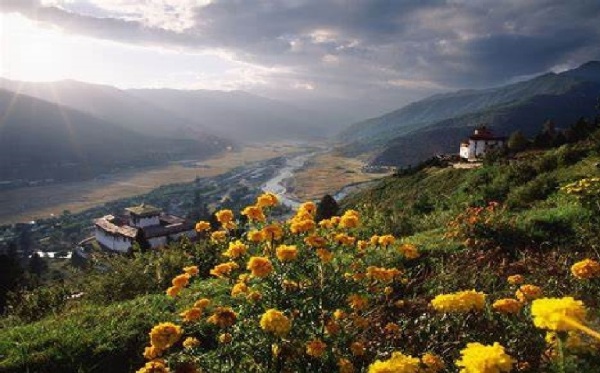New Delhi, August 20, 2023: After ruling the Gross National Happiness (GNH) index for several years (being the happiest nation in the world), Bhutan has added another feather to its cap by becoming the country with net zero emissions status. Besides achieving this feat, the country has also transformed itself into a carbon sink (absorbing more CO2 than producing/releasing) country. Thanks to the 70% forest cover, uncompromised commitment to the environment, rich cultural heritage, production of hydroelectric power.
According to a World Economic Forum reportbased on the data collated by Energy Monitor, besides Bhutan seven other countries have also attained this remarkable feat of achieving net zero emissions. The nations that have achieved net zero emissions include Bhutan, Comoros, Gabon, Guyana, Madagascar, Niue, Panama, and Suriname.
Bhutan is committed to the Paris Agreement (An international treaty on climate change) wherein 196 countries became the signatories of this agreement in the UN Climate Change Conference (COP21) in France, in 2015. The goal of the agreement is to limit global temperature increase to 1.5 degree Celsius by decarbonizing sectors like agriculture, industry, energy, transport, etc. However, the world will still be emitting 50 gigatonnes of Co2 by 2030 with greenhouse gas emissions growing rapidly, as per reports.
Bhutan’s sustainable practices and environmental commitment
One common thread among all these 8 nations is their sustainable practices and the policies and efforts to increase the forest cover. Bhutan, for instance, has a 70% forest cover with a population of 8,00,000. The country prioritizes sustainable organic farming, forestry practices, relies on hydropower and does an exemplary tourism management. The country charges a $200 sustainable development fee per day from the tourists. This highlights its commitment towards eco-tourism and environmental protection.
The mountain nation is an example of a circular economy with factors like rich cultural and spiritual heritage, a climate-smart forest economy, smart and sustainable forest management, wildlife conservation, limiting forest fires, and sustainable forest management for timber, fruits, and rubber, being the major drivers.
The nation that today boasts of 70% forest area was facing a big challenge in the 1990s wherein its forest cover had reduced to 60% due to excessive logging. However, it bounced back, enforcing strict laws and a systemic crackdown on illegal timber operations and retrieved its 70% forests again within a decade. Bhutan has also started some pilot projects for sustainable timber construction solutions.In 2015, Bhutan's volunteers had set a world record by planting 49,672 trees in just one hour.
How other small nations are doing it
Similarly, though Comoros is a poor and densely populated nation, it has low emissions from agriculture, fishing, and rearing livestock. Thanks to the strict environmental protection policies that the country adheres to.
Gabon, on the other hand is committed to sustainable management of its natural resources and non-deforestation. Gabon has even earned the tag of a model of environmental conservation from the UN.Furthermore, Panama is fortunate to be blessed with rainforests and low population. However, the government plans to reforest 50,000 hectares of land by 2050.
Sikkim and Chandigarh leading the way in India
Meanwhile, Sikkim in India has found out a unique way of becoming carbon negative.It aims to plant 100 saplings for every newborn. On the other hand, data from a forest department study said that 112 government schools in Chandigarh have become carbon negative. Chandigarh too is determined to become carbon neutral by 2030.












.jpg)



